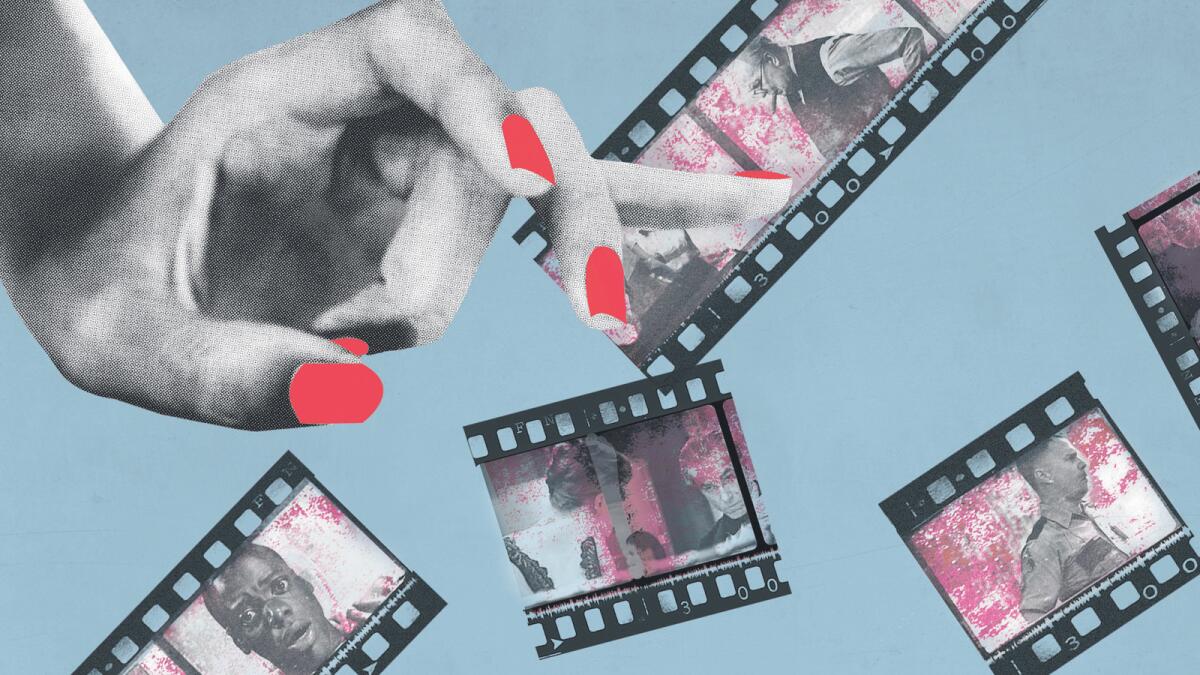‘Get Out’s’ alternate ending is among the great scenes cut from this year’s Oscar nominees

- Share via
Just because you’ve fallen in love with one of this year’s best picture Academy Award nominees doesn’t mean you’ve actually seen the whole film. As with any production, there are incredible moments that make it all the way to the edit suite – but not to the final cut. We spoke with five directors and editors responsible for the Oscar-nominated version of the film to tell us about the scenes that just didn’t pass the final audition.
“Darkest Hour”
What’s missing: “Winston Churchill [Gary Oldman] is in the War Room, and it’s 4 in the morning and a film projector has been set up,” explains director Joe Wright. “He’s eating chicken, drinking Champagne and watching Laurence Olivier and Vivien Leigh in ‘That Hamilton Woman,’ which was Winston’s favorite movie, and it was a film that was originally made as a piece of propaganda. In the film, Lord Nelson [Olivier] makes a big speech about standing up to tyrants.”
Why cut it? “The idea was that this would inspire Winston,” Wright says. “But it felt a little too on-the-nose and unnecessary. So I lost it. I think it’s the only scene that didn’t end up in the cut.”
WATCH: Video Q&A’s from this season’s hottest contenders »
“Get Out”
What’s missing: The original ending in which Chris (Daniel Kaluuya) is not saved by the timely arrival of his friend Rod, but is instead caught by the police and put in jail; later Chris is shown dissuading Rod from investigating the case further.
Why cut it? “It was a beautifully performed scene, a sad scene and very poignant and honest about what happens to so many people who find themselves in the wrong place at the wrong time,” says writer-director Jordan Peele. “But I realized I had asked the audience to sit through so much tension and claustrophobia, and to deny them that victory, it didn’t make sense. The ending we got, the moment that [what appears to be a police] car comes, the audience gets that whole original ending in that moment. That’s more powerful than if I’d told them what happened.”
“Call Me by Your Name”
What’s missing: The Perlmans (Michael Stuhlbarg and Amira Casar) are in their bedroom with the window open because it’s summer and hot. They’re able to hear their son and his boyfriend whispering down in the garden, and Mrs. Perlman goes to her husband, takes the book from his hands and begins to kiss him. “They are perhaps inspired by the tenderness going on in the garden outside their window,” suggests director Luca Guadagnino.
Why cut it? “It’s a beautiful scene, but we were in a place in the movie where we wanted to go straight forward,” he explains. “It didn’t help the pacing.”
“Phantom Thread”
What’s missing: In at least one version of the film, Reynolds (Daniel Day-Lewis) had multiple children with multiple “baby mamas,” explains editor Dylan Tichenor. In this particular scene, Reynolds is part of a dinner at the family manor, and two of his adult daughters are present while Alma (Vicky Krieps) cooks dinner. “The scene escalates and becomes a raucous shouting match, culminating in Alma threatening to stab one daughter with a spoon.”
Why cut it? “At this point, we just had too much movie and a lot of stuff had to go,” says Tichenor. “Although we all really liked the sequence, the dramatic tension in the film between Reynolds and Alma existed with or without this material about his kids and other relationships. We got the point early on that Reynolds is a bit of a womanizer. So, it was a scene that Paul [director Paul Thomas Anderson] really fought for but in the end we had to serve the overall story first.”
“Three Billboards Outside Ebbing, Missouri”
What’s missing: Drunk, Jason Dixon (Sam Rockwell) climbs on to his sleeping mother’s bed to give her a cuddle and asks if they can still be friends after an argument they had earlier.
Why cut it? “It was just nuts,” says director Martin McDonagh. “Sam had on big, baggy white underpants and was stumbling all over the place, breaking stuff – Sam himself was stone cold sober, I must add. It was a very funny scene, but at that stage of the film another comic scene wasn’t necessary. The balance of comedy and tragedy needed to tip toward tragedy from that point.”
More to Read
From the Oscars to the Emmys.
Get the Envelope newsletter for exclusive awards season coverage, behind-the-scenes stories from the Envelope podcast and columnist Glenn Whipp’s must-read analysis.
You may occasionally receive promotional content from the Los Angeles Times.






